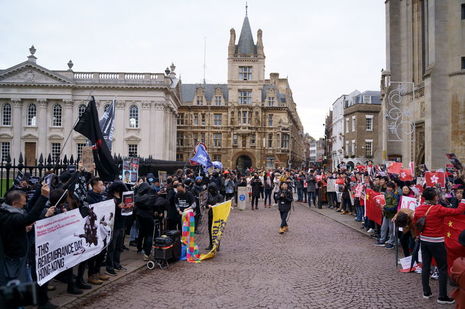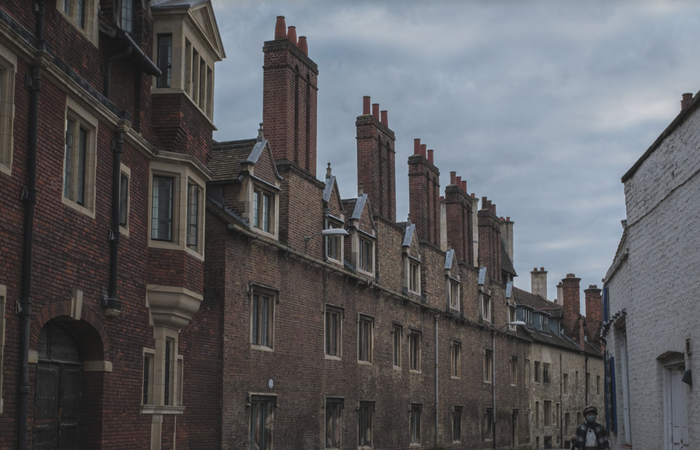Cambridge University attempts to navigate new era of China relations
The University had hosted at least three researchers from the Chinese Academy of Engineering Physics (CAEP) since 2014

A Telegraph article published earlier this month developed claims made in a controversial CIVITAS report, published last month, that the University had hosted at least three researchers from the Chinese Academy of Engineering Physics (CAEP) since 2014, including one scholar from the CAEP on “shock wave and detonation physics.”
According to research by the Australian Strategic Policy Institute: “CAEP’s four main tasks are to develop nuclear weapons; research microwaves and lasers for nuclear fusion ignition and directed-energy weapons; study technologies related to conventional weapons; and deepen military-civil fusion.”
In addition to this, the article from the Telegraph said that Professor Simon Redfern, formerly head of the Earth Science department at Cambridge, took up a role as a visiting professor “at a subsidiary” of the CAEP, the Center for High Pressure Science and Technology Advanced Research (HPSTAR).
According to the Telegraph this was founded in 2012 and is used to target foreign talent.
HPSTAR, like its parent institution CAEP, is named on a US sanctions list because of the risk of its research aiding the Chinese military.
Professor Redfern told Varsity that “HPSTAR’s Director is Dr Dave Mao, who was raised in Taiwan and spent most of his career as Senior Staff Scientist at the Carnegie Institution of Washington, USA (the ‘geophysical lab’).
He is a Foreign Fellow of the (UK) Royal Society and a Member of the United States Academy of Sciences - he is a world-leader in high-pressure research and has received many accolades for his work, and it was this that attracted me to work with him and his colleagues at HPSTAR.”
“A key precaution is that HPSTAR must avoid all classified and proprietary research and everything they have done is open and publishable. Indeed, if you read any of the papers that resulted from my collaboration with people there you will see that there is absolutely no military or dual-use related research. All my work has, or is being, published in the open literature.”
Questions have also been raised by The Times, The Spectator and The Daily Mail over the University’s relationship with Tencent.
Tencent are a Chinese technology firm, one of the most valuable in the world with a market value of c.$483bn as of 2018, whose developments include the messaging service WeChat.
In 2019 the University received a “generous gift” from Tencent for the funding of the Dowling Fellowship, a new five-year postgraduate engineering research fellowship. At the time of the Fellowship’s establishment, a Tencent representative said: “We are delighted to be partnering with Cambridge...[and] to be contributing to the development of this new research area.”
Tencent have been accused of having a very close relationship with the Chinese government. According to CIA sources, Tencent have previously received money and support from the Ministry of State Security, China’s main intelligence agency. Tencent strongly deny these accusations, refuting them as “entirely false”.
A spokesperson for the University told Varsity that they “have a robust system for reviewing strategic relationships and donations”, adding that the Committee on Benefactions, External and Legal Affairs (CBELA) scrutinises sources of funding “that might be inappropriate on ethical grounds.”
“Academic freedom is a fundamental principle of the University, and no donor directs research that they fund - this is core to our mission, and our integrity.”
Jesus College have been reported as having links to Tencent by The Daily Mail and The Times. The Times highlighted that the Yidan Prize for education, established by Chen Yidan co-founder of Tencent, has been hosted in Jesus for the last three years.
A Jesus spokesperon stressed: “In 2016, several years after stepping down as Tencent’s Chief Administration Officer, philanthropist Dr Charles Chen Yidan established the Yidan Prize...The College hosted the European leg of the Yidan Prize Conference Series between 2018-20; the Conference will be hosted by Oxford University in 2021. The prize has never been awarded to an academic or alumnus of Jesus College.”
The College emphasised that it “has a legal duty to promote freedom of speech” and highlighted that in 2016 they “adopted a policy statement where it reaffirmed its commitment to freedom of speech and expression.”
They continued: “we offer a platform where academic debates on a range of subjects are encouraged. It would, in our view, be a mistake to take conversations about China off the table.”
The examples raised in the Telegraph article, and in the CIVITAS report, demonstrate the difficulties universities like Cambridge face in adapting to the changing geopolitical situation.
Professor Redfern notes that his research at HPSTAR was conducted at a time when “the UK science community was being encouraged to build links with Chinese colleagues... this was the period when China was being courted by UK government to support the construction of a new nuclear power station at Hinkley Point.”
He added that this was “also at a time when the UK government was still planning to use Huawei technology for the 5G network.”
A University spokesperson told Varsity that “since 2015, academics have responded to calls encouraging relations with Chinese counterparts and we would welcome greater support from government to navigate an evolving geopolitical landscape that seeks to balance trade relations with national security considerations.
All of the University’s research is subject to ethics governance and export control regulations.”
The desire for greater clarity in how universities should interact with China was echoed by Vice-Chancellors speaking anonymously in a Financial Times article.
Universities have required export controls for partnerships focusing on sensitive technologies but the toughening regime on China meant more applications involving China were being rejected.
“We do feel we’re working somewhat in the dark,” one Russell Group vice-chancellor told the Financial Times.
“There is a bit of a sense that we’re not entirely sure what’s changing, how it’s changing or why . . . we don’t really know what will be turned down.”
 News / University Council rescinds University Centre membership20 February 2026
News / University Council rescinds University Centre membership20 February 2026 News / Hundreds of Cambridge academics demand vote on fate of vet course20 February 2026
News / Hundreds of Cambridge academics demand vote on fate of vet course20 February 2026 News / Judge Business School advisor resigns over Epstein and Andrew links18 February 2026
News / Judge Business School advisor resigns over Epstein and Andrew links18 February 2026 News / Union cancels event with Sri Lankan politician after Tamil societies express ‘profound outrage’20 February 2026
News / Union cancels event with Sri Lankan politician after Tamil societies express ‘profound outrage’20 February 2026 News / Caius students fail to pass Pride flag proposal20 February 2026
News / Caius students fail to pass Pride flag proposal20 February 2026










